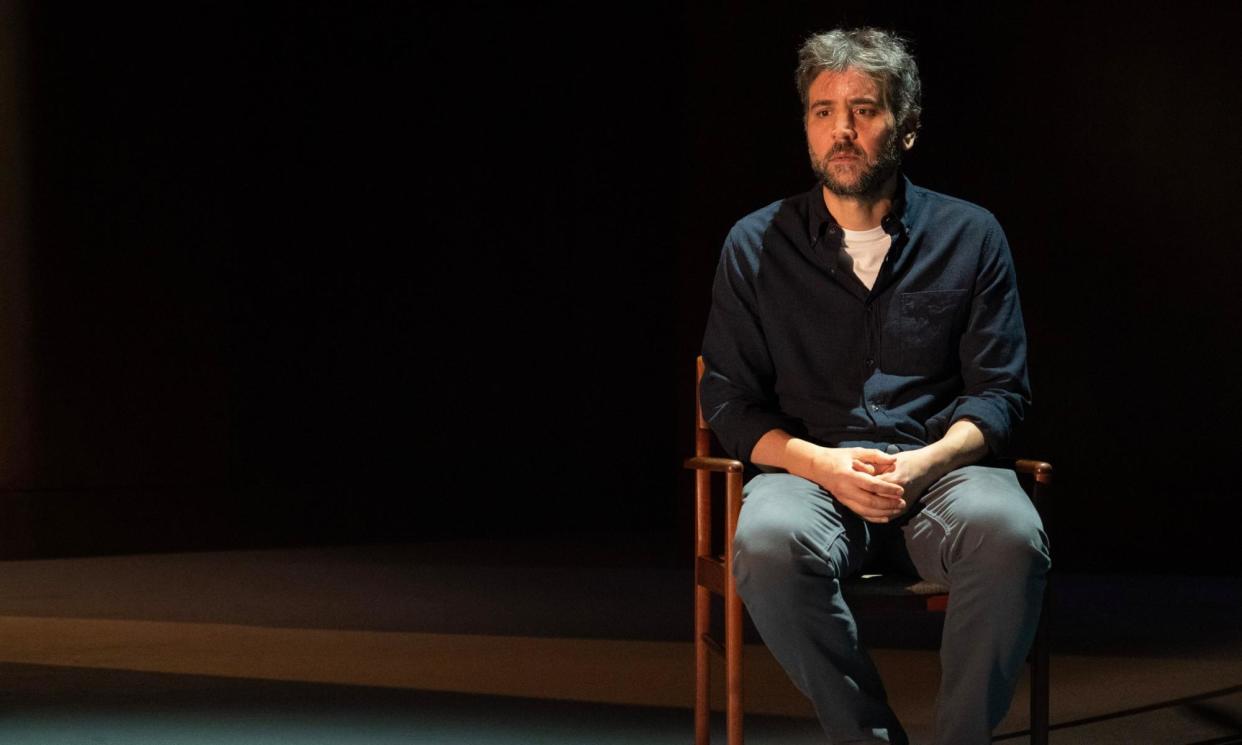The Ally review – intense but unwieldy play tackles big issues

In The Ally, a new play by Itamar Moses, arguments flow into each other seamlessly, even if the arguments themselves are often jagged and multidirectional. Staged in front of 270-degree seating at the Public Theater in Manhattan, director Lila Neugebauer transitions between scenes without blackouts or set changes (there are no sets and few props, apart from a couple of folding chairs and a few packets of papers). Instead, actors exit and enter barely missing a beat, as whatever character bridging the sequences – usually Asaf Sternheim (Josh Radnor), a playwright and part-time college professor – turns to his next scene partner. Asaf isn’t a confrontational guy, yet he keeps finding himself in the midst of conversational minefields – especially for someone who only teaches, as he’s reminded in a running gag, just one class. That’s “14 days a year”, his wife, Gwen (Joy Osmanski), playfully reminds him, given that his once-a-semester class meets once a week.
Related: Days of Wine and Roses review – 60s marital drama becomes Broadway musical winner
Asaf is only teaching because Gwen has recently accepted a job with the university’s administration, but he has enjoyed interacting with promising students. So when Baron (Elijah Jones), one of his best, asks for his signature on a manifesto in light of police violence against the local Black community, Asaf agrees – appalled and saddened to hear that the most recent victim was Baron’s cousin. Reading over the document before endorsing it, Asaf stumbles slightly over some language related to the Israel-Palestine conflict, not least because of his Jewish family. Ultimately, he decides to sign anyway; he knows the author, Nakia (Cherise Boothe), from his undergraduate years, and agrees with almost all of her points, even if he might have a quibble or two with the details. But when students Rachel (Madeline Weinstein) and Farid (Michael Khalid Karadsheh) approach him about sponsoring a new Jewish student group, Asaf winds up hemming, hawing and a lot more, as his “complicated” thoughts on Israel wind up coming under fire from a range of vantages. Open academic debate (which is how Asaf would like to think of these conflicts, whether they qualify or not) quickly turns into something fiercer and more personal.
Moses, then, is willing to wade into some treacherous waters here, and often does so with a sharp sense of humor that nonetheless refuses to dismiss anyone outright. He invites identification with Asaf, as the guy who fancies himself the reasonable and thoughtful liberal (and, crucially, a playwright with a background not unlike his creator’s), while still skewering his “nice guy” sensitivity and blind spots. Radnor, who played the half-lovable and half-maddening Ted Mosby on the sitcom How I Met Your Mother, is perfectly cast in the role, and the rest of the cast makes gripping work of their various passionate speeches and apoplectic sputtering. Moses and his cast capture the righteousness of conviction, the impatience it creates in those who feel it, and then the counter-righteousness that springs from that impatience – the unforgiving nature, in other words, of discourse.
But there are times when The Ally short-circuits through exactly the live wire that powers it: the work’s close connection to current events unfolding as we speak. It’s easy to imagine a liberal college professor opposed to police violence who nevertheless feels an uncomfortable hesitation to fully condemn Israel, or yoke that country’s actions to injustice in the United States, or participate in what he might see as the downplaying of antisemitism. But given the way that this particular character is written, it’s hard to imagine Asaf nitpicking language that speaks out against Israel’s current attacks on Palestinian people.
Of course, he’s not really doing that, because those actions aren’t actually mentioned directly in the play. The Ally was not written in response to the most up-to-the-minute horrors of the world; how could it be, premiering in February 2024? Instead, the play is in the uncomfortable position of being set “now”, but not precisely now. That’s not exactly the fault of Moses, who has continued to tinker with the work as it prepares to open. It does, however, create an unavoidable dissonance where The Ally is somehow both intensely contemporary and immediately outdated. So many aspects of the show, like the way that both acts begin with house lights up as if the audience is attending a lecture, cleverly underline how its concerns bleed into real life – which in turn makes the audience hyper-aware of the points the characters aren’t allowed to make. It makes every speech feel both overflowing and incomplete.
It’s possible that the incompleteness is the point. It’s possible, too, that The Ally would still come across as unwieldy even if it had premiered one year ago, or five. As the more fraught second act continues, the everyone-gets-a-turn speechifying starts to crowd out the cathartic laughs that punctuate the serious business back in the first act. (When a few of those sharp, petty lines return toward the end, the relief of actual laughter, however quasi-inappropriate, is palpable.) The pre-existing relationship between Asaf and Nakia sometimes feels like a writer’s conceit more than something lived-in, with perfectly illustrative anecdotes related at key moments. Maybe that’s an inevitable byproduct of a play that dedicates so much time and energy to the act of debate. Even if the pin-drop intensity of The Ally dissipates quickly afterward, there’s something admirable about a play in which so many of its characters appear ready to make a didactic case against its very existence.
